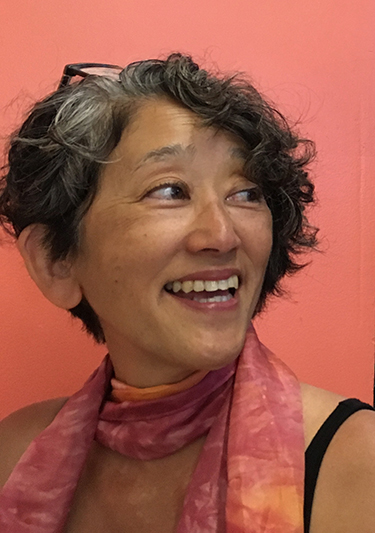Campus News
Karen Yamashita offers dazzling short stories about growing up in Japanese America
Sansei and Sensibility, the latest book by UC Santa Cruz emerita professor of literature Karen Tei Yamashita is a dazzling collection of short stories about growing up and living in Japanese America.


Sansei and Sensibility, the latest book by UC Santa Cruz emerita professor of literature Karen Tei Yamashita is a dazzling collection of short stories about growing up and living in Japanese America.
Blending fiction and history, Jane Austen and the Japanese immigrant experience, American pop culture and Japanese traditions, these inventive, witty, often surreal, and sometimes poignant stories explore the pain and strength of the Japanese American experience.
Sansei and Sensibility is a retrospective of Yamashita’s short pieces, including her very first short story, The Bath, which was originally published in 1975 in Amerasia Journal.
Featuring an intergenerational cast of Japanese-American characters, the book offers the perspective of what it’s like to be a “sansei”—the grandchild of Asian immigrants—contemplating what to pass on to the next generation.
“The first half of the book are stories previously published but also dipping into our sansei world over the years,” said Yamashita. “I included a timeline to show comparatively the Japanese American generations (issei, nisei, sansei) along with significant historical events, particularly pertaining to Los Angeles and Southern California, where I was raised.”
“When my mother died at age 99 in 2015, I finally figured out that we sanseis were no longer the juveniles of the sixties, the rabble rousers who forced the hand of the Japanese American redress movement and Asian American studies; we were the has-been,” she added. “It seemed to me that some record of what we’ve been and done might be of interest, if to no one but our memorial selves”
Yamashita described how the book came about.
“The inspiration for this collection is my sister Jane Tomi. She has been a longtime reader of Jane Austen and a Janeite, a very conscientious and active member of the Jane Austen Society. Truth is, I hadn’t really read Jane Austen, so I finally did, all of the novels, and wondered why my sister, a Japanese American sansei, would become a fan of this literature. I still don’t really know why she’s a fan, but as I read Austen, I began to think about my sister and me, growing up as we did in a tightly knit provincial Japanese American community in Los Angeles. And I transferred our experiences into that world.”
In writing the new collection, as well as her previous book, Letters to Memory, Yamashita had to revisit the history of the Japanese American internment through the eyes of her parents and their generation.
“My sister and I were born after the war, and we did not learn of the imprisonment of our parents and their families until we were older, say in junior high school,” said Yamashita. “Even then, the consequences of that history were not clear to us. As I reflected on our childhood in that community and wrote these stories, I began to understand that what had been hidden in memory and shame had always been there percolating, that it was the backdrop that formed our social relationships, the quiet antagonisms, and the hurt that festered in our proposed future. For Japanese Americans, the postwar has meant something particular; perhaps that is what these stories try to feel for.”
The author of eight books, Yamashita received a 2011 California Book Award in the Fiction category for her novel I Hotel, and was a finalist for the National Book Award. I Hotel also won the American Book Award, the Asian/Pacific American Librarians Association Award, and the Association for Asian American Studies Book Award.
Known for her intensely researched works that reflect her interest in communities whose stories often go untold, Yamashita received the Chancellor’s Award for Diversity in 2009 and was co-holder with feminist studies professor Bettina Aptheker of the UC Presidential Chair for Feminist Critical Race and Ethnic Studies.
“During my 20 years at UCSC, teaching and working with students, I worked with faculty in hopes of creating an Asian American studies program,” said Yamashita. “We came away with Critical Race and Ethnic Studies, and I worked with Bettina Aptheker in Feminist Studies to support the programming in these fields of study.”
“Over time, in my literature lecture courses, I’d see more Asian American students, who were not in the humanities but in the sciences, business, computer science; they’d balk at the reading in the syllabus, but I’d say, please stay, take it pass/no pass, but stay; this is important; it’s about race and immigration, and you need to know this to understand the world out there whatever work you choose to do.”
“Now I think about our teachers in ethnic studies, American history, critical race and gender studies, all across the nation, how what they’ve had to say in their classes has been so necessary and essential to American education,” she added. “They too are essential workers. We need to support and to give them space.”
__________________________________________________________________________________________
Note: A virtual event celebrating Karen Yamashita’s new book, ‘Sansei and Sensibility’, will take place on August 13, at 7 p.m. (PST), presented by Bookshop Santa Cruz and UCSC’s Humanities Institute (THI). This online event is free and open to the public. For more information and to register for the event, go to the THI web site.